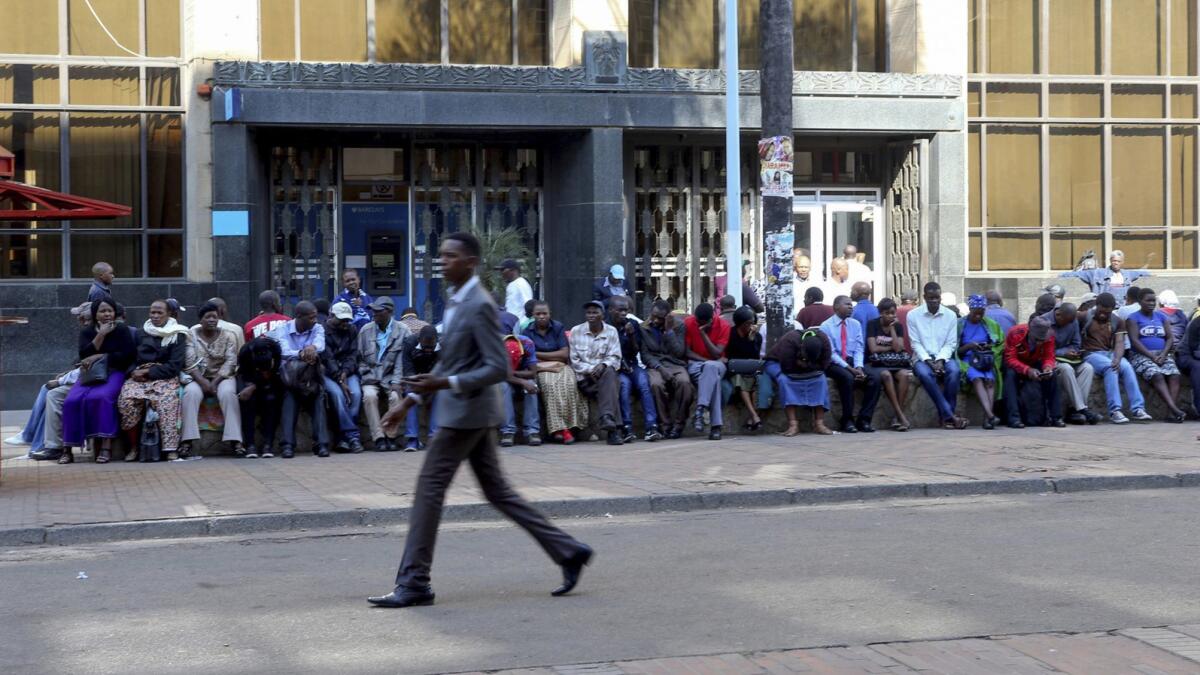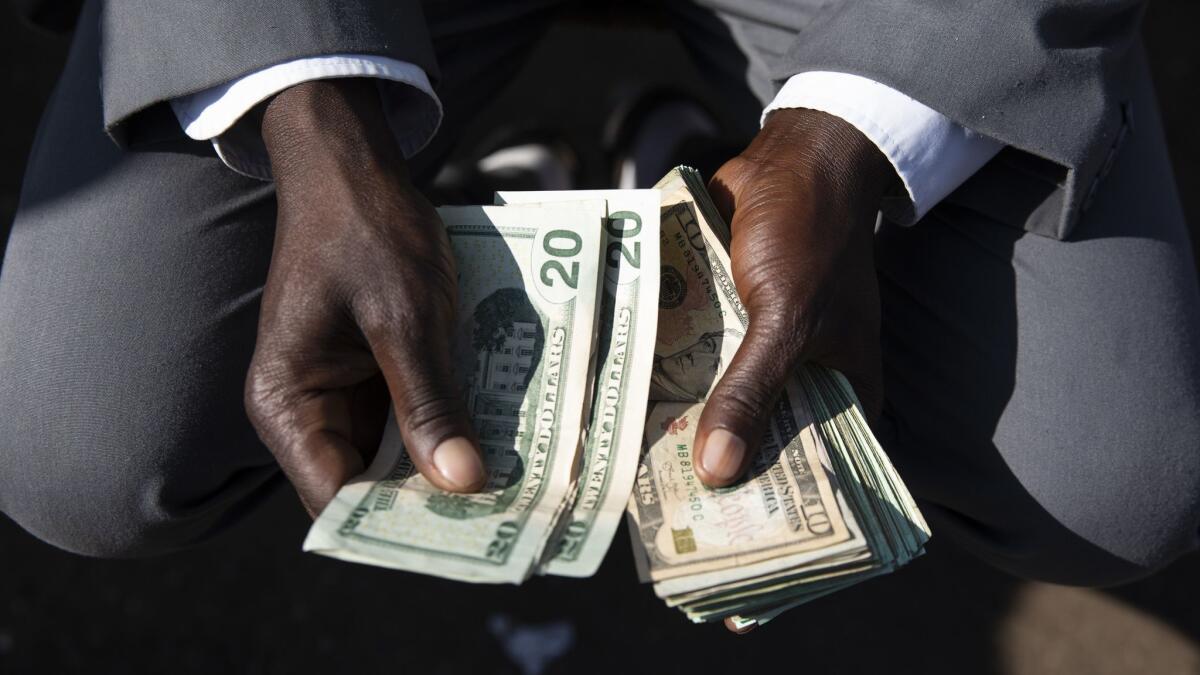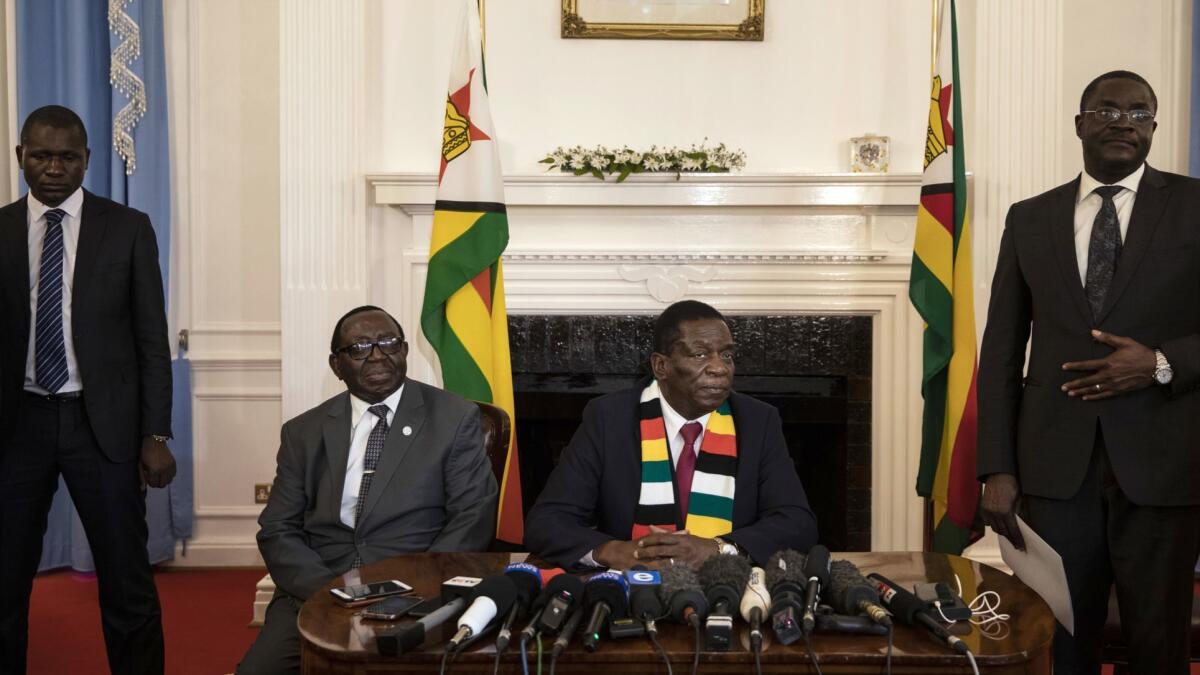Zimbabwe and its newly elected president face an economy in shambles

The lines start forming each weekday before dawn.
At banks across this crowded capital, workers in suits, women carrying babies, and retirees bundled up against the morning chill wait for hours in hopes of withdrawing some money from their accounts.
On a lucky day, a customer will walk away with $30 in bond notes, the national currency pegged to the U.S. dollar. Sometimes a bank simply runs out of cash and there is no choice but to try again the next morning.
“It’s a disaster,” said Godwill Ndhlovu, a 25-year-old who arrived at CABS bank near downtown at 5 a.m. the other day. “These things will never end.”
The long-running cash shortage is one of the most visible symptoms of a wrecked economy. Zimbabwe’s financial woes are the biggest challenge facing President Emmerson Mnangagwa, who came to power in November after the military ousted Robert Mugabe and was elected last month.
With its mineral and agricultural resources, Zimbabwe was once one of Africa’s most promising economies. But those prospects eroded, particularly during the later part of Mugabe’s 37-year rule. The agricultural sector plunged into crisis after 2000, when he started seizing large white-owned commercial farms. Mass unemployment has forced millions of Zimbabweans abroad in search of work.
After hyperinflation forced the government to abandon the Zimbabwean dollar in 2009, the economy staggered on using increasingly scarce U.S. bank notes. In 2016, the government introduced a parallel currency called the bond note to put more in cash into circulation, but it quickly lost value on the black market. As more people keep their money out of the banking system — a resounding show of no-confidence in the country’s financial health — there’s been less cash to go around.

Mnangagwa has pledged to change all that, campaigning under the slogan that Zimbabwe is “open for business.” He has promised to end the cash shortages, bring investors back to the country, revive industry and create more jobs. In June, he said the economy would hit 7% growth over the next five years — 10 times the rate in 2016.
But first he must tend to more immediate problems.
On Aug. 1, two days after a peaceful election, the army launched a bloody crackdown on an opposition demonstration in downtown Harare, opening fire on protesters and bystanders and killing six people.
Tensions have not subsided. On Friday, opposition leader Nelson Chamisa, who accused the government of rigging the vote, filed a court petition challenging the results. Mnangagwa won 50.8% of the official count, and Chamisa was second with 44.3%. The court has 14 days to make a ruling.
Mnangagwa’s inauguration, which was set for Sunday, has now been delayed, the justice minister told reporters Friday.
In the last week, the police and military have arrested, harassed and beaten people they say are opposition supporters, and several opposition leaders have gone into hiding. On Thursday, Tendai Biti, a senior opposition politician, was arrested in Harare after trying to seek asylum in Zambia and being denied and deported. He was released but is facing charges of inciting public violence.
A fair and peaceful election was seen as crucial for drawing foreign investors and donors back into the country. Mnangagwa’s government had welcomed observers from the U.S. and the European Union with the aim of showing the world that Zimbabwe had changed.
The observers have yet to issue their final reports. But the U.S. and several European diplomatic missions in Zimbabwe have condemned the targeting of opposition members by security forces.
“There should be no role for violence, intimidation, or harassment in the new Zimbabwe,” U.S. State Department spokeswoman Heather Nauert said in a statement Thursday.
Unrest and uncertainty will only dampen the prospects of economic revival.
“You see a stark difference between the president’s reassurances that Zimbabwe is open for business and his true showing of colors since the polls closed,” says Charles Laurie of Verisk Maplecroft, a risk consultancy based in Britain.
“The concern for investors is now: Which Mnangagwa do you believe? It may be the turn of the opposition now to be the target of the government, but it may be the turn of investors down the road.”

In Mashonaland Central, a longtime Mugabe stronghold and the province where Mnangagwa won nearly four times as many votes as Chamisa, supporters of the president and the ruling ZANU-PF party said they are confident the new government can lead Zimbabwe out of its current mess.
Several farmers in Glendale, where many people received farms confiscated by Mugabe, said they were happy with the new president.
“People really felt it was time for a change and time for new ideas,” said Petula Muringai, a 52-year-old farmer.
That Mnangagwa was an insider in the Mugabe-controlled government is an advantage, she said. “He has seen the worst of what was happening. He is coming in as a genuine person concerned with the people.”
Not that Muringai and her neighbors think things are perfect. They have a long list of things they’d like to see the president tackle during his first year in office: better roads, schools and hospitals; less corruption; more industry and jobs; and, of course, more cash.
But they think the opposition’s rejection of the election results is basically a case of sour grapes, or “putting mud in the porridge,” as Oliver Kasanhai, a retired army captain who now farms, puts it.
In downtown Harare, an opposition stronghold where Chamisa won handily, dozens of vendors line up on the sidewalks and streets to sell used clothes, bags and fruit in a sprawling market. The political unrest has already been bad for business.
A group of young vendors who sell handbags and used clothes said they’ve had fewer customers in the last week because people are afraid to come downtown. And they don’t expect things to get much better under Mnangagwa.
“He said he would have a lot of companies open, millions more jobs, fix the roads,” said Charles Berzek, a 20-year-old who transports clothes for the vendors. “People here in the city, they really know things aren’t going to change.”
More to Read
Start your day right
Sign up for Essential California for news, features and recommendations from the L.A. Times and beyond in your inbox six days a week.
You may occasionally receive promotional content from the Los Angeles Times.






